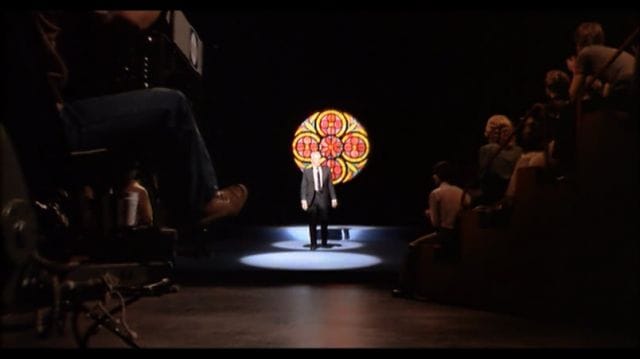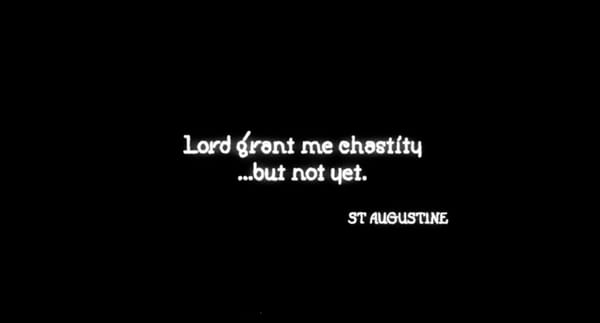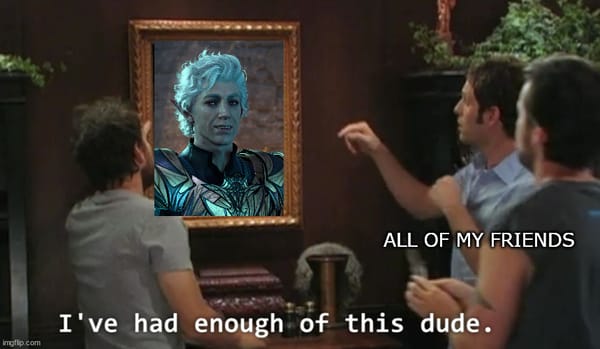Network, or the entertainment value of anger (originally posted on Substack on July 8th, 2021)
It's a good movie

In one of my history classes in high school, I watched a clip from Network without any prior knowledge of the movie. All I knew was Peter Finch’s illuminated face projected onto a screen pulled down over the chalkboard, and the words that stayed with me long after: “I’m mad as hell, and I’m not going to take it anymore!” He told us to scream it out the windows, everyone watching – and people did.
The scene is here:
That was where the clip began and ended – an at first solemn address that transformed into a righteous and cathartic outburst of anger. I didn’t know anything about what happened in the movie before or after, and I didn’t much care. I was only fourteen or fifteen when I watched that clip, but by then I’d already been angry for a long time, in a typically teenage but not unfounded way. I was a perfect student overachieving within a very narrow definition of success, and I hated myself for it. I hated my complicity in some overarching system that I couldn’t define and felt powerless to fight against. I was certain, as Finch’s character Howard Beale said, that somehow it was all bullshit. Worse, the fact that I succeeded in a bullshit system meant that my accomplishments and maybe my entire life was bullshit. Since I couldn’t fight it concretely, since I didn’t know how to not be bullshit, I instead chafed and suffered and continued to overachieve and internalized that rage. The scene from Network tapped into all that. It sent a tether into my anger. It told me other people were angry, too, and at some point we weren’t going to take it anymore.
I finally watched Network for the first time in full the other night, not realizing it contained the scene that made such an impression on me all that time ago. Howard Beale’s outburst arrives much earlier in the movie than I would’ve assumed based on my teenage memory. It wasn’t a long-awaited moment of catharsis, or one of awakening among a scattered people shaking off a malaise, as it had been for me. In context, it was something thrilling but sad – a beautiful, natural moment of emotion and togetherness that was ripe for exploitation.
To put Beale’s on-air outburst in context, his ratings as a nightly news anchor have been down and his longtime employer is putting him out to pasture. The night before, he announced his departure and just as casually added that he would be killing himself on air in a week’s time rather than leave the job. This simply won’t do for the network, so they’ll be having him leave immediately, but they give him one more chance to apologize and say goodbye during his show. However, before he is meant to give his goodbye, he is visited by an apparition that he believes is God. God gives Beale a message to pass on to the people through his show, which he does, bringing us to the scene in the clip above.
After, the network is still horrified, but they allowed the scene to play out, and they can’t help but notice that ratings go up. Up and up and up. They realize they can use Beale. Instead of firing him, they give him his own show not as an anchor, but a prophet. They take his anti-corporate, anti-rat race rantings and use them to sell advertising. (You can draw a straight line from Network to Daniel Kaluuya’s episode of Black Mirror, “Fifteen Million Merits.”)
There’s some amusingly meta commentary on the arc of story, what will hold your attention in television and what won’t. Max Schumacher, the older president of the news division, leaves his wife for the young rising star exec Diana Christensen, who’s currently stealing his career and exploiting Howard on air. Eventually, Diana and Max’s relationship falls apart, and he returns to his wife like he knows the story wants him to. Before he goes, he tells Diana she’s incapable of loving people because of television. Because she was raised on it, unlike his generation, she lives her life as a facsimile of what she has seen on screen, and can only view relationships through entertainment value or their ability to generate ad revenue. Diana’s character is supposed to be a gorgeous and empty shadow of a shadow, and we’re supposed to accept that.
In the end, Howard’s anti-business rantings threaten ratings more seriously than they help, and Diana arranges for real-life revolutionaries from one of their docuseries to assassinate him on air. It’s the crossover episode nobody asked for. The cameras are there for the big moment – one on each assassin, another pushing in on Finch’s bullet-ridden face.
We never see Max’s return to his wife; after he leaves Diana, he leaves the screen, and therefore the spectacle. But I had wanted him to come back. I wanted to see him challenged in his analysis of Diana’s character. She may have been shallow and ratings-obsessed, true, but wasn’t she shallow and ratings-obsessed due to the TV-network culture he helped create? Didn’t he shape the monster he was sleeping with? The script paints him as “not like the other network guys,” since he’s a newsman with a passion for truth and integrity, but no one ever points out that he’s wistful for a past that never quite existed, at least not where TV news is concerned. We know this now better than ever – if it’s on TV, it’s empty entertainment, regardless of intention. And even if it doesn’t start out that way, it eventually morphs into spectacle, the way all living beings somehow bend toward evolution into crabs and trees. I wanted Diana and his wife to be able to ask, what about you, Max? Do you think this isn’t your fault, too?
After finishing Network, I just kept thinking about Beale. The only honest man in that entire film, honest and right only because he was going insane. It wasn’t the point of the film at all, but I kept wishing that Beale and I had been given a better chance. Since the first time I saw him screaming, my anger has only become sharper and stronger. His anger was nebulous, and could easily have been applied in one political direction or the other. It was blank and emotional enough to be relatable on a four-quadrant level. But it still wasn’t wrong. Maybe some things about the world have gotten better since Network’s time, but a lot is worse. I want to stay in that scene, devoid of context, because the context is too depressing. So let’s pretend, for the sake of entertainment, that I can get what I want – Howard Beale is angry as hell. He’s not going to take it anymore. The nation is spellbound; he is heard and understood. We all rise up, and we shout out the windows together. We even drown out the rain.
Some end notes:
- A thought that didn’t really fit in the essay: I’m one of those terrible people that genuinely loves Aaron Sorkin’s rightfully-panned short-lived TV show The Newsroom, and I see now that it is the un-satire version of Network, which isn’t a compliment to The Newsroom. Network mostly sees the cruel joke inherent in what The Newsroom believes; The Newsroom paints a picture of the world that Max was so nostalgic for, a fantasy world that none of us can live in.
- Probably you can summarize this post with this instead (RIP Yahoo Answers):

- I read The Answers by Catherine Lacey recently and enjoyed it a lot.
- I also recommend Emily St. James's thoughtful and devastating article on what happened when the Twitter mob came for sci-fi writer Isabel Fall.




